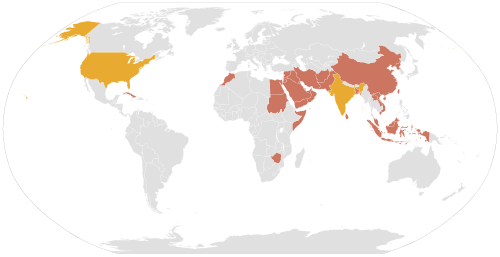Capital punishment for drug trafficking

Only under certain conditions
Capital punishment for drug offenses
In certain countries illegal importing, exporting, sale, or possession of drugs constitute capital offences that may result in the death penalty. According to a 2011 article by the Lawyers Collective, an NGO in India, "32 countries impose capital punishment for offences involving narcotic drugs and psychotropic substances."[1] A 2012 report by Harm Reduction International "documents the 33 countries and territories that retain death penalty for drug offences, including 13 in which the sentence is mandatory."[2]
Countries that apply capital punishment for drugs
| Country | Charge(s) |
|---|---|
| |
|
| |
|
| |
|
| |
|
| |
|
| |
|
| |
Option when second conviction for drug trafficking in quantities specified.[1] |
| |
|
| |
|
| |
|
| |
|
| |
|
| |
|
| |
[3] |
| |
|
| |
|
| |
|
| |
|
| |
|
| |
Saudi Arabia ranks third in the world for the most executions. 43 percent of those executed in 2015 had been convicted of smuggling drugs, ranging from heroin to marijuana.[4] |
| |
see Misuse of Drugs Act (Singapore) |
| |
|
| |
|
| |
|
| |
|
| |
|
| |
|
| |
|
| |
Very large quantities or mixtures of heroin, cocaine, ecgonine, phencyclidine (PCP), lysergic acid diethylamide (LSD), marijuana, or methamphetamine.[5][6][7] The United States Supreme Court in Kennedy v. Louisiana struck down capital punishment for crimes that do not result in the death of a victim, but left open the possibility for "offenses against the State" – including crimes such as "drug kingpin activity" (and treason and espionage).[8][9] |
| |
|
| |
|
| |
Gallery
 The Singapore embarkation card contains a warning to visitors about the death penalty for drug trafficking under the Misuse of Drugs Act. Warning signs can also be found at the Johor-Singapore Causeway and other border entries.
The Singapore embarkation card contains a warning to visitors about the death penalty for drug trafficking under the Misuse of Drugs Act. Warning signs can also be found at the Johor-Singapore Causeway and other border entries.- A sign at the Taiwan Taoyuan International Airport warns arriving travelers that drug trafficking is a capital offense in Taiwan.
See also
- Legality of cannabis#Use of capital punishment against the cannabis trade
- Misuse of Drugs Act (Singapore)
- Capital punishment in Singapore
- Capital punishment in the Republic of China
- Van Tuong Nguyen
- Use of capital punishment by country
References
- 1 2 Bombay High Court overturns mandatory death penalty for drug offences; first in the world to do so. 17 June 2011 by Lawyers Collective. "Consequently, the sentencing Court will have the option and not obligation, to impose capital punishment on a person convicted a second time for drugs in quantities specified under Section 31A. ... Across the world, 32 countries impose capital punishment for offences involving narcotic drugs and psychotropic substances."
- ↑ Death Penalty for Drug Offences Global Overview 2012: Tipping the Scales for Abolition. 27 November 2012. Harm Reduction International. "Tipping the Scales for Abolition documents the 33 countries and territories that retain death penalty for drug offences, including 13 in which the sentence is mandatory."
- ↑ Moroccan man gets death for drug trafficking Archived 21 October 2013 at the Wayback Machine.. 31 May 2013. New Straits Times.
- ↑ Mass Execution Is Part Of Saudi Arabia’s Long History Of Horrors. By Kim Bellware. Jan. 6, 2016. Huffington Post.
- ↑ The Federal Death Penalty Act of 1994. Criminal Resource Manual 69. United States Department of Justice - United States Attorneys' Office. "In passing this legislation, Congress established constitutional procedures for imposition of the death penalty for 60 offenses under 13 existing and 28 newly-created Federal capital statutes, which fall into three broad categories: (1) homicide offenses; (2) espionage and treason; and (3) non-homicidal narcotics offenses."
- ↑ The death penalty for drug kingpins: Constitutional and international implications. By Eric Pinkard. Fall, 1999. Vermont Law Review. "In 1994 Congress enacted the Federal Death Penalty Act (FDPA) with provisions permitting the imposition of the death penalty on Drug Kingpins. The FDPA is unprecedented in American legal history in that the death penalty can be imposed in cases where the Drug Kingpin does not take a human life." See also: Violent Crime Control and Law Enforcement Act, and the section on the Federal Death Penalty Act.
- ↑ 18 USC § 3591 - Sentence of death | Title 18 - Crimes and Criminal Procedure | U.S. Code. Title 18 of the United States Code. Legal Information Institute.
- ↑ Syllabus. Kennedy v. Louisiana. Syllabus posted on SCOTUS blog. SCOTUS is Supreme Court of the United States.
- ↑ Chapter 4: The Death Penalty for Non-Homicide Drug Trafficking? Kennedy v. Louisiana and the Federal Death Penalty Act Archived 12 October 2013 at the Wayback Machine.. By Seth Gurgel. From the book The Contemporary American Struggle with Death Penalty Law: Selected Topics and Cases. U.S.-China Death Penalty Reform Project of the U.S.-Asia Law Institute of NYU School of Law. A paragraph from it that summarizes things (emphasis added):
Making this discussion somewhat easier is the fact that in a recent case totally unrelated to drug trafficking (the case itself addressed the constitutionality of imposing the death penalty for rape of a child where no death occurs), Kennedy v. Louisiana, the U.S. Supreme Court conducted a detailed analysis of the distinction between crimes that do and do not take a human life and the relationship of each type of crime to the death penalty. Within this analysis, in a non-binding portion of the Court’s opinion (dictum), the Court drew an analytical line separating “offenses against the individual” from “offenses against the State.” In its holding, the Kennedy Court stated that, at least within the category of “offenses against the individual,” the death penalty is unconstitutional for crimes that do not take a human life, because the punishment of death is “excessive” and “disproportionate” to the crime, pursuant to the Eighth Amendment’s prohibition on “cruel and unusual punishment.” With respect to the other category, however – “offenses against the State” – including crimes such as drug trafficking (and treason and espionage), even when they do not result in a death, the Court left open the possibility that the death penalty might not be unconstitutionally “excessive” punishment.
External links
Methods of execution:
- Methods of Execution. Death Penalty Worldwide project.
- Methods of Execution by Country - NutzWorld.com
Resources for references:
- Death Penalty | StoptheDrugWar.org. Ongoing compilation of articles about countries sentencing people to death for drug offenses.
This article is issued from Wikipedia - version of the 11/18/2016. The text is available under the Creative Commons Attribution/Share Alike but additional terms may apply for the media files.